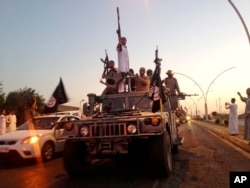Despite all of the attention and resources that the United States and other countries have put into counterterrorism efforts, Sunday's mass shooting in Orlando, Florida, shows the threat from individual actors remains and is particularly difficult for governments to fight.
There are no indications at this point that the Orlando shooter had a direct connection to Islamic State, and FBI Director James Comey said Monday the agency believes he was radicalized through the internet.
Eric Rosand, a senior foreign policy fellow at the Brookings Institution, says the attack is an example of how Islamic State's message is being received by many young Muslims who have no coordination with the group but are angry, lost, and attracted to its vision of violence and destruction.
"Countries have to deal with it essentially on their own," he told VOA. "They have to somehow come to terms with societies that are communities feeling marginalized, individuals feeling lost, and there's no mechanisms in place to actually prevent this, not adequate resources and innovation being directed towards the prevention aspect of the problem internally within each country."
The U.S. State Department said in a report earlier this month the number of terror attacks worldwide dropped 13 percent last year, while deaths fell by 14 percent.
Amy Pate, research director at the University of Maryland's National Consortium for the Study of Terrorism and Response to Terrorism, which prepared statistics for the report, says terrorist violence ebbs and flows over time but she does not see its total elimination as realistic. She told VOA what the world could see is fewer deadly attacks.
"There was a point in time when terrorists actively avoided killing people," she said. "They wanted the publicity, but the negative publicity that came with deaths was something they tried to avoid. If you think of some of the European groups like the IRA or ETA, these are the modalities that they followed. They wanted attention but not a body count. So I think there is a way to walk back from what we’ve seen as this increase in mass lethality and mass casualty terrorism.”
Nearly two years ago, U.S. President Barack Obama declared a goal of eradicating Islamic State and set up a coalition to attack the group militarily and to disrupt its finances and its attraction for foreign fighters. There has been success in taking back territory the militants once held in Iraq and Syria, but the group still persists in large areas of those countries and has influence elsewhere.
Rebecca Zimmerman, an analyst at the Rand Corporation, says the easiest part of eradicating Islamic State is attacking areas where the group tries to act like a state and exposes itself militarily. But she told VOA that while Islamic State has lost territory, it remains a "pernicious and difficult threat."
"This is one of the difficult things about terrorism, it’s virtually impossible to know when you are done fighting it," she said. "How do you draw that line to say okay we won? What does that day look like, the day that you decide you won the war on terror? So yes, I can say that I think we’ve made progress in the fight against ISIS in Syria and Iraq, but that doesn’t mean that we’ve eroded the global threat of terrorism and it doesn’t mean that we’ve defeated the Islamic State."
Rosand said governments have focused on killing, capturing, arresting and prosecuting terrorists, but that when the fighting in Iraq and Syria one day ends, many countries will not be prepared to handle the thousands of militants who will return home.
"There’s a recognition now that not enough energy and resources and thinking are going into the front end on prevention and the back end on reintegration," he said. "There’s a concerted effort on the international level to develop some best practices, to invest resources, to provide training to countries that are interested in developing programs."
Rosand identified the Netherlands and Denmark as two countries that have sophisticated programs already, albeit on a small scale, while Britain's response to the hundreds of people returning from Iraq and Syria is to put them in jail.
"It’s not willing to take the risk of anything other than prosecution. And I think ultimately that’s a lot of the problem, is that we as a society are so risk averse in terms of this threat that there may not be a political appetite, a public appetite, for more risk taking in terms of policy making and that really limits options.”






